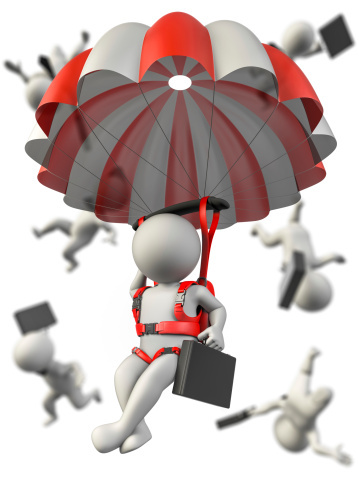Reducing Small Business Risk With The Right Insurance
Starting your own business is a thrilling adventure. But with any thrill comes a certain degree of risk. Skydivers use backup parachutes. The trapeze artist has a safety net. And race car drivers have helmets and flame retardant suits. What protection can the budding young entrepreneur look to in order to minimize their risk? The answer is insurance.
Not all businesses require the same types of insurance, but every business needs to be insured in some way. Here are a few of the most common types of insurance designed to minimize your entrepreneurial risks.
Property Insurance
Even a fortress can fall. Fire, floods, thieves, and thugs can all wreak havoc on your property. That’s why it is important to protect your building and everything in it against damage or total loss. A good policy should cover both your premises and the contents therein.
Business Interruption Insurance
How will your business stay afloat while your fortress rebuilds? This is where business interruption insurance comes in handy. Just as disability insurance provides income to a sick or injured person who cannot work, business interruption insurance keeps your business solvent while it is temporarily “disabled.”
Entrepreneur‘s “Business Interruption Insurance: What It Will–and Won’t–Cover” recommends that “if your company is growing quickly, document many months of profits to demonstrate that income is accelerating” in order to prove this projected income. This way you will not miss out on any of your profits.

Liability Insurance
Everyone makes mistakes and, sometimes, others hold us accountable for our errors. Financially accountable. And, without the protection of liability insurance, you could lose everything in a lawsuit. Thankfully, there are a number of different types of liability insurance, enabling you to protect yourself from all angles.
- General Liability. This type of insurance covers you against injuries to customers or employees, or their property, while on your premises. It should include both their medical expenses and your legal fees in the event that you find yourself being sued.
- Product Liability. What happens if a product that you sell, distribute, or manufacture causes personal injury or property damage? If you are covered by Product Liability Insurance, you will be protected against resulting lawsuits and legal bills.
- Professional Liability. If your business involves providing client advice or a professional service, you may need to be protected against damages that result due to “errors or omissions,” negligence, or malpractice.
Vehicle Insurance
If your business operates company vehicles or you use your personal vehicle for business purposes, you will need to ensure that you are properly ensured. Liability insurance is a must, but if you have a lease or vehicle loan, you will also require collision and comprehensive coverage. “How Commercial Insurance Cuts Down on the Risks of Owning a Small Business” warns that if one of your drivers makes a mistake in traffic and causes a collision, you could wind up being sued by a number of injured parties. You had better be insured.
Accounts Receivable Insurance
Sometimes clients are slow to pay. And, sometimes, they go bankrupt. This lost income can leave your business vulnerable. After all, you still have a payroll, accounts payable, and other bills to cover. If you have Accounts Receivable Insurance or Credit Insurance, you will be protected against uncollectable accounts.”What is Accounts Receivable Insurance” states that the cost to cover a domestic business will usually be around 0.5% of sales and that the costs for an international business will be between 0.5% and 1% of sales.
You would never ride a rollercoaster without ensuring that your restraints are in place. And you wouldn’t go white water rafting without your life jacket. It only makes sense, then, that you shouldn’t go into business without the protection of insurance.
What type of business insurance has proven the most valuable to your company? Why?




